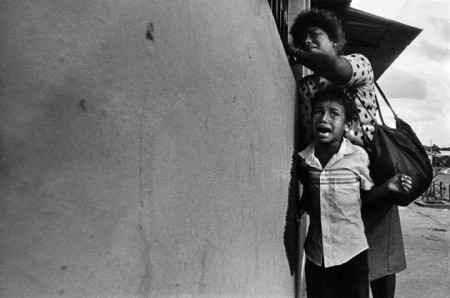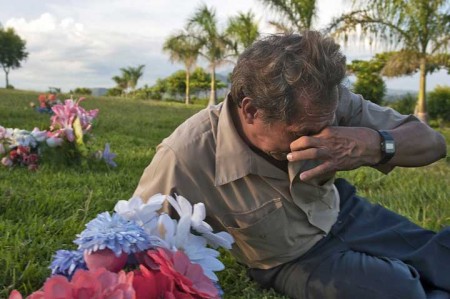Emotional and psychological trauma is the result of an extraordinarily stressful event or events that shatter the sense of security, making someone feel helpless and vulnerable. The traumatic event may be a single experience or may be episodic. The sense of being overwhelmed can be immediate or can be delayed for weeks or years or even decades as a person struggles to cope with pressing circumstances.

After three days hiding, during aerial bombardment and intense combat between the Salvadoran army and FMLN guerrillas in San Salvador, El Salvador these civilians try to escape. The child has just seen a helicopter and begins screaming in terror.
In times of war, psychological trauma also known as “shell shock” can cause an acute stress reaction and lead to post-traumatic stress disorder, which interferes with the ability to cope and may involve physical changes to brain chemistry. Such stress does not only affect combatants—although the term PTSD and the foundational studies were done with numerous Vietnam war veterans who returned to civilian life numbed or demoralized by their combat experiences. The incidence of alcohol and substance abuse was found to be particularly high among this group. However studies of non-combatants such as journalists who have frequent and repeated exposure to violent conflict also reveal greater vulnerability to stress reactions and greater reliance upon such drug and alcohol related coping mechanisms.

A 13-year-old Guatemalan boy examines a gift that his father, a gang member serving a 36-year prison sentence made for him. The boy is doing poorly in school and gets into trouble often.
It is now widely understood that the impact of emotional trauma upon the civilian population in situations of war or chronic violence can be severe and long lasting. Although most children are resilient, when childhood trauma is not resolved, the sense that the world is a frightening and dangerous place may carry over into adulthood setting the stage for further difficulties. And studies show that resiliency can be weakened by the repetitive exposure to violent traumatic episodes. The impact of chronic repetitive violence in non-war situations remains a significant area of concern in need of study particularly in urban centers experiencing high rates of drug-related homicide.
Typical causes of psychological trauma that have an especially strong impact on children are: sexual abuse, direct experience of violence, witness to violence or its threat against others, and catastrophic events such as earthquakes, floods or volcanic eruptions. Although not all people who experience a potentially traumatic event will become psychologically traumatized it is known that risk factors such as poverty may have a detrimental impact upon resilience.
The symptoms of trauma vary greatly in expression and severity from one person to another. Some common reactions include: re-experience of the event in the form of flashbacks, nightmares or insomnia that can lead to avoidance of reminders of the trauma, known as triggers. These cues can disrupt a person’s coping mechanisms leading to panic attacks, intense inappropriate anger, upsetting memories, emotional detachment or dissociation known as “numbing out.” Sometimes these feelings lead to despair, loss of self-esteem and depression. Despite their best efforts traumatized parents may themselves have difficulty in assisting their children with emotional regulation.

Gangs in San Salvador killed Don Rigoberto’s son. A year after his son's murder he remains inconsolable.
The psychosocial aspects of gang involvement require more serious consideration by law enforcement as well as by those engaged in violence prevention. Youth who suffer from so many risk factors as do excluded youth from US immigrant and impoverished communities and young people in Central America who have experienced a legacy of both war and chronic violence, require an integrated approach to well- being. Clearly rule of law is critical, as impunity undermines belief in the social institutions of the State leading too often to retaliatory violence. But justice must also be proportionate and restorative. Greater understanding of emotional risk factors can strengthen violence prevention efforts aimed at restoring self-esteem and resilience.